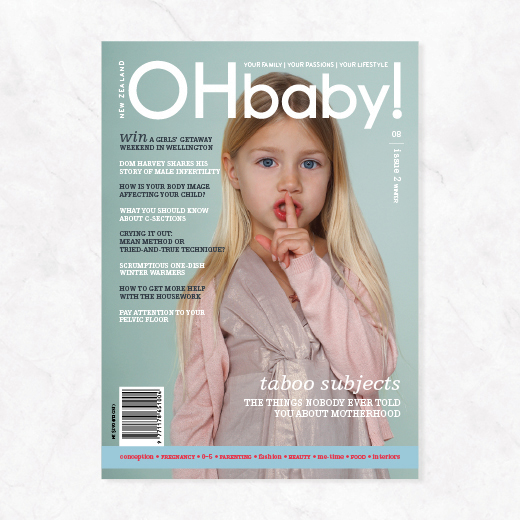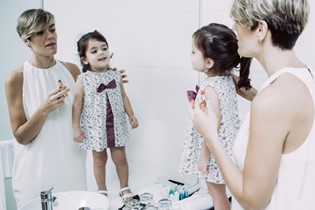Quality time,

When you spend time with your child, are you really giving him your attention, or is your mind somewhere else? Psychologist Pauline Ogilvy gives some suggestions for finding family time and spending meaningful moments with your child, even on your busiest days.
Before you had children, you probably imagined all sorts of "warm fuzzy" moments: Reading storybooks, blowing bubbles, getting snuggly hugs from a toddler who wraps his arms around you like a monkey, piggy-back rides through the local reserve, giggles over a funny face, ruffling your child's hair or cradling your newborn's head in the palm of your hand as you smother her face with kisses. These are the moments you treasure and hold on to in the midst of the non-stop job of parenting - a job that doesn't give you any tea breaks, lunch hours, or annual leave.
But how can you create these special moments when life is so busy, and the demands of housework, your career, balancing the budget, keeping up with family commitments, and extra-curricular activities like swimming lessons, ballet, music groups, and sports seem to keep piling up without respite?
Why family time is so important
Carving out time for your family is crucial in helping your children to develop into well-adjusted people, giving them a firm foundation for growth and maturity. Family time helps your children feel that they are loved and cared for. In a secure family unit, children feel protected and kept from harm, and their needs for safety, stability, and predictability are met. Family time allows children to feel free from anxiety about where their next meal comes from, who will care for them, where they will rest their weary bodies, and who looks after them if they are hurt, sick, or upset. This grounding is fundamental to your child's healthy development, and creates a most favourable environment for them to grow up in. It gives them a sense of belonging, and helps to ensure that their emotional and social well-being are encouraged.
Family time and playing with your children allows such skills as conflict resolution, good communication, the development of good values, dominance sharing, imagination, and creativity to blossom, not to mention
the physical and educational benefits that also occur.
But how can you manage to find time to spend with your family, getting to know them and working to build that critical bond between family members? Here are some tools to help you make family time a priority.
Spend time with your child
When your child wants your attention and you give it to him, it makes him feel valued and respected. Of course, with a young child, if you say, "Just a minute!" and expect him to wait for you, often by the time you're ready to give him your attention, the moment has passed and he has forgotten why he wanted to talk to you in the first place!
When your child calls out to you to look at something he has made or done, make the time to go over to him and address what he is trying to explain to you. "Wow, Jacob, look at the big track you've put together for your trains! Show me how it works!" or "Madeleine, the pattern of your beads is beautiful. Did you do that all on your own?" are great things to say to engage your child's attention and encourage him to open up to you.
Making an effort to give your child attention in this way teaches him great independence skills and helps him to learn to focus. Furthermore, it allows your child lots of problem-solving opportunities, rather than needing you as a parent to do everything for him. When your little one is frustrated with something, be ready to assist him and to show him how to do something himself.
Don't go overboard
Finding balance between family time and other commitments is a tricky thing. On the one hand, your family does need to be together and bond. But on the other hand, if you're spending every waking moment together, you may create an undesirable situation of co-dependence that's hard to break out of.
The good news is that while you do need to set aside dedicated family time, you don't need to spend every waking moment of your day with your child. If you are constantly hovering over your little one, she may start thinking that you exist solely to entertain her, and you'll create an imbalance in your relationship that will rear its ugly head when you justifiably try to spend time by yourself (getting me-time), be alone with your spouse, or simply shift your focus to pay a bill or fold the washing.
As your child grows older, she needs to gain independence and learn that it is okay to play on her own. If you're constantly attending to your child, you'll foster in her an unrealistic perception of herself as the centre of the entire universe. This will set her up for disappointment when she does finally realise that life is not all about her, and her unrealistic expectations won't serve her well. Your child should be expected to have independent time to herself and to respect your need for this as well, when she is old enough to begin to understand the concepts of me-time and taking a break.
Create routines
Routines around what typically happens in your household, such as eating, sleeping, baths, and any other regular activities and occurrences, are pivotal to creating happy children. Routines give children a sense of predictability and safety. Routines mean that your children are not constantly asking for food, since you have set mealtimes, morning tea and afternoon tea times. Children are alert and of good cheer when they are getting enough sleep. When they know what to expect at bedtime - a bath, pyjamas, tooth-brushing, a story, and lights-out, for example - their sleep is more regular and they sleep better, with less interruptions or fights about going to bed.
Routines also give structure to each day, especially for parents. They provide a sense of control and a pattern, especially during the early days when new parents can feel frustrated at the lack of control over their time. When your days feel like they're being swallowed up by comforting, feeding, caring for, and entertaining your little ones, routine may even provide windows of opportunity for a little me-time - time for a rest, to read a magazine, get some paperwork done, or make a phone call. Even routines around weekly events can help children to anticipate and look forward to things like play group, storytime at the library, play dates, visits to the swimming pool or playground, or even a regular afternoon of childcare swapping, where playmates come to your house one week and go to a friend's house the following week while you or the other child's parent have child-free time. This can be especially valuable as it provides social opportunities for your child to learn the art of playing with others in his or her age group.
Make the most of opportunities.
Frequent, short bursts of time are very rewarding to children, and are
meaningful to them, especially when these are child-initiated. So when your child comes to you, indicating (in a positive way) that they want your attention, respond to them whenever possible. This also facilitates learning. If your child brings you an insect, asking, "Mum, what's this?", take the time to identify the creepy-crawly, and to explain what its purpose is, and talk about where it came from. Take advantage of this teaching opportunity. Your child will relish your time and be attentive to what you are saying, especially if you're speaking to them in a fun, age-appropriate manner, and is more likely to be interested than when you're the one initiating the lesson.
Look around your home
Set up your home environment in such a way that it is functional and assists in the smooth running of the house. Invest in toy bins that can be easily rolled out for playtime and put away when it's over. It's great to have two or three toy bins that you rotate, so that you bring one out for the week, then put it away and bring another one out next week, making the novelty value of the toys higher than if they were all set out and available at once.
If you have a preschool-age child, set her up for play by getting down to her level and beginning an activity. After a short while, leave her to carry on by herself by making a statement that helps to keep her focus on the goal, not on your leaving. "I wonder how tall you can make this block tower?" helps to focus her thinking on the task at hand. Occasionally return to check on her, making encouraging statements or joining in if time allows.
At other times, just have fun and play with your child. If you're feeling a bit pressured and realise that you're frequently telling your preschooler that you're too busy and you'll play with him later, try to set a time so that both of you know what to expect. This alleviates a child's frequent disappointments and your sense of guilt. Perhaps make a statement like, "When the washing is on the line and I've had a cup of tea, I will sit down with you to read books."
It's perfectly okay to get down on the floor and be silly with your child. You may think that, for example, playing dolls with your daughter is the most boring activity in the world, but it's incredibly important and enriching to her. Practice playing, and, over time, it will become more comfortable and even enjoyable as your relationship with your child is enriched. It's also highly valuable to her as well, as you are establishing in her mind that she is worthwhile and worthy of your time.
If you sense a battle of wills, such as when you're playing with blocks and you suggest building a house but your child wants to build an airplane, allow your child to take the lead. Describe his progress to him and assist with his play. Being a conversationalist gives a rich vocabulary to what your child is doing, and he will learn better communication himself.
The sharing of a lead role also communicates respect and a willingness to share in his play, and powerfully validates his creativity and imagination as you play along with him.
Play for the different ages
The word "play" means different things for children of different developmental ages. For infants and babies, play consists of our interactions with them using "motherese" language, and the provision of toys that stimulate their five senses. "Motherese" speech stimulates babies' communication and bonding with us.
Rattles, mobiles, and activity gyms are all valuable toys, though be aware that the natural environment is also rich in stimulation - a walk to the letterbox is plentiful in sound, movement, visual impact, and even touch. It's easy to over-stimulate infants, either by providing too much stimulus or by providing this for too long periods of time. Attempt to "read" your baby's interest level and their tired signs.
Toddlers love to explore and their need for supervision is paramount at this age. They prefer to watch and copy others of their own age, as well as play alongside them. They are self-focused and need to be taught to take turns and to share. Two- to three-year-olds like to play alongside one another, but will share play themes, such as all of them digging for treasure in the sandpit. Cooperative play occurs a little later, where they are able to negotiate the playing with others towards a common goal, such as building a hut or playing a simple game with rules like "Simon Says". Rivalry and teasing is common at this age, and learning about fairness, kindness, and working together is necessary.
Plan ahead
Sometimes finding family time means planning ahead. Plan your time out
as a family, and ask your child for input on what they'd like to do in your family time. Even a three-year-old has an opinion on whether they want to go to the playground or take a picnic to the park! Make one day of the week a set day of relaxation for your family, where no one feels pressure to do things. Make meal time a family time. There are numerous benefits of eating together as a family - helping with toddler eating difficulties, promoting healthy eating habits through adult modelling, instilling good table manners, creating the opportunity for shared communication, connecting, and having a set time to plan and organise family events. This last point is very important, especially as your children get older and have more activities and responsibilities that need to be fitted in with family time.
Change your focus to family. In the business world, a very important principle is to focus on the core business. As a parent, your core business is raising your children, without losing the plot along the way! When your life gets busy to the point that you don't have time to spend with your family, it's time to make some changes. If your budget allows, outsource as much as you can. Get help with housecleaning, ironing, or outdoor chores like lawnmowing and gardening. Shop online for groceries and other items - you can buy just about anything on the internet nowadays. If you are running a home business, outsource the accounts or payroll. A huge issue with home businesses is prioritising your time so that you have separate "business time" and "family time". Many small business owners and home businesses tend to work at all hours, with children playing around their feet. It might work better to arrange for childcare outside your home, so that you can devote time to your business without being distracted by the children, and then have dedicated time with them without needing to take care of work at the same time.
If you're lucky enough to have a library or toy library nearby, make good use of it. These provide ample sources of reading material, puzzles, games,
audiobooks, and music, all of which are of educational and entertainment value to your whole family. Also make use of our wonderful local beaches, parks, and playgrounds. These are great places for families to spend time together exploring.
Make it a habit to participate in activities that interest your children. This will stand you in good stead in years to come by laying relational foundations. Enjoy these fun, busy years!
Pauline Ogilvy is a psychologist with KEY Psychology (Child-Family-Education), based in Rodney and the North Shore, Auckland. Pauline is a parent of three. Visit www.keypsychology.co.nz to find out more.

AS FEATURED IN ISSUE 2 OF OHbaby! MAGAZINE. CHECK OUT OTHER ARTICLES IN THIS ISSUE BELOW

















